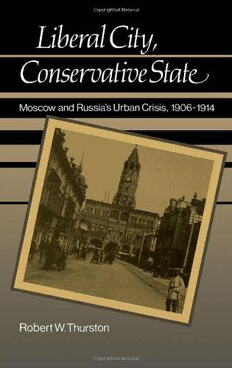
Liberal City, Conservative State: Moscow and Russia's Urban Crisis, 1906-1914 PDF
279 Pages·1987·20.594 MB·English
Most books are stored in the elastic cloud where traffic is expensive. For this reason, we have a limit on daily download.
Preview Liberal City, Conservative State: Moscow and Russia's Urban Crisis, 1906-1914
Description:
Between 1906 and the outbreak of World War I, Moscow was the locale of great uncertainty and experimentation. Moscow's liberal leaders sought social and political stability for their city following the violence of the 1905 revolution by offering attractive programs in education, employment, housing and other areas to Moscow's unruly lower classes. They were countered in their efforts, however, by central authorities of the Old Regime, who feared the political effects of these programs and stressed social rigidity. Liberal City, Conservative State examines the resulting clash between the city and the state as it brought to the surface and exacerbated the deep tensions plaguing Russia by the eve of World War I. It focuses on the roots of this dispute, juxtaposing the Old Regime's rural background and orientation with the urban concerns of Moscow's liberals, and sees the state's essential failure in its inability to come to terms with the realities of urban life and growth. Providing new perspectives and insights into Russian liberalism, the scope and urgency of urban problems, and the importance of tsarist ideology in conditioning development after 1905, Moscow's story sheds light on the unsolved dilemmas and contradictions that pushed Russia inexorably toward revolution.
See more
The list of books you might like
Most books are stored in the elastic cloud where traffic is expensive. For this reason, we have a limit on daily download.
